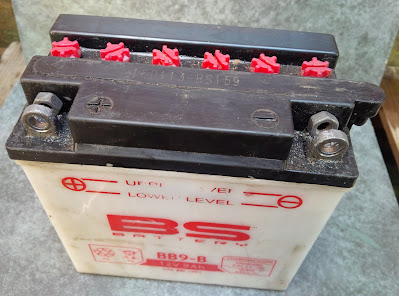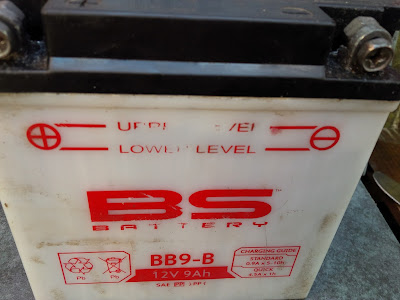First i like to test the battery on the bike .
Test at the battery posts and at the battery Positive and negative wire terminals to ensure you have good voltage at both and to ensure clean terminals .
then test again with engine running .
You should over 12v and them close to 14v at 6000 revs .
Battery , make sure its fully charged remove from bike and recharge dont just guess ,
and whilst doing this clean up the battery terminals and the negative and positive wiring terminals .
If you have a voltage meter you can do some basic tests.
When the engine has been off for at least 1-2 hours with ignition key turned off,
100% Charged 12.60 to 12.8v
75% Charged 12.4v
50% Charged 12.1v
25% Charged 11.9v
0% Charged less than 11.8v
I always clean the terminals of a battery on routine Maintenance too , and i always test ground wires for continuity but its best to test earths with a 4 amp test light to ensure adequate current flow .
sorry for photo best i could find but you get the idea test your grounds for minimum 4 amp current flow .
I remove battery and clean the outside , baking power is recommended to neutralise the acid and any spilled acid under the battery to stop corrosion .
Test at the battery posts and at the battery Positive and negative wire terminals to ensure you have good voltage at both and to ensure clean terminals .
then test again with engine running .
You should over 12v and them close to 14v at 6000 revs .
Battery , make sure its fully charged remove from bike and recharge dont just guess ,
and whilst doing this clean up the battery terminals and the negative and positive wiring terminals .
If you have a voltage meter you can do some basic tests.
When the engine has been off for at least 1-2 hours with ignition key turned off,
100% Charged 12.60 to 12.8v
75% Charged 12.4v
50% Charged 12.1v
25% Charged 11.9v
0% Charged less than 11.8v
I always clean the terminals of a battery on routine Maintenance too , and i always test ground wires for continuity but its best to test earths with a 4 amp test light to ensure adequate current flow .
sorry for photo best i could find but you get the idea test your grounds for minimum 4 amp current flow .
I remove battery and clean the outside , baking power is recommended to neutralise the acid and any spilled acid under the battery to stop corrosion .
Now test battery and top up electrolyte level
remove all the top caps for each cell
and check the level indicator on the front of the battery
all mine were low so had to top them all up .
Use only Deionized water - as the level falls the acid becomes more
powerful so you are adding water to dilute the acid to its correct strength
so do not add acid .
I would now charge the battery to full capacity im not going to as i do not have time during this post but will later .
After charging or before you can test each individual cell to see if you have a faulty cell
test between positive and first closest cell
and then between cells
You are looking for around 2v per cell to indicate excellent battery , id ignore my results
as one its not an excellent battery to i just topped up the water levels and there it was totally
flat but you get the idea .
---------------------------------------------------------------------------
Last thing to check is a load test connect the battery back into the bike
and whist turning the bike over so on heavy electrical load test the voltage at the battery
if you read less than 11v you have duff battery 11v and over indicates a good useable battery .
If in doubt just replace the battery , you can buy them quite cheap














Hi Great article,
ReplyDeleteHave an issue with my speedo. I have no lights, no revs and no speed. Bike starts, lights work, all electrical components seem to work. My cluster doesnt. well, sometimes it does, sometimes it doesnt.
Battery sits at 12v and 14v when revved. Have seen battery drop to below 12v when starting but not continuously. Would this be a cause for the speedo to work and then not work?